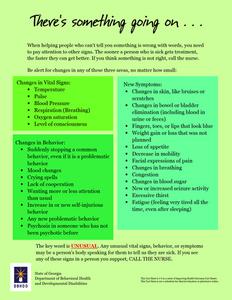When helping people who can't tell you something is wrong with words, you need to pay attention to other signs. The sooner a person who is sick gets treatment, the faster they can get better. If you think something is not right, call the nurse.
Be alert for changes in any of these three areas, no matter how small:
Changes in Vital Signs: Temperature Pulse Blood Pressure Respiration (Breathing) Oxygen saturation Level of consciousness
Changes in Behavior: Suddenly stopping a common behavior, even if it is a problematic behavior Mood changes Crying spells Lack of cooperation Wanting more or less attention than usual Increase in or new self-injurious behavior Any new problematic behavior Psychosis in someone who has not been psychotic before
New Symptoms: Changes in skin, like bruises or
scratches Changes in bowel or bladder
elimination (including blood in urine or feces) Fingers, toes, or lips that look blue Weight gain or loss that was not planned Loss of appetite Decrease in mobility Facial expressions of pain Changes in breathing Congestion Changes in blood sugar New or increased seizure activity Excessive thirst Fatigue (feeling very tired all the time, even after sleeping)
The key word is UNUSUAL. Any unusual vital signs, behavior, or symptoms may be a person's body speaking for them to tell us they are sick. If you see any of these signs in a person you support, CALL THE NURSE.
State of Georgia Department of Behavioral Health and Developmental Disabilities
This Fact Sheet is # 6 in a series of Improving Health Outcomes Fact Sheets. This Fact Sheet is not a substitute for clinical evaluation or physician's orders.
